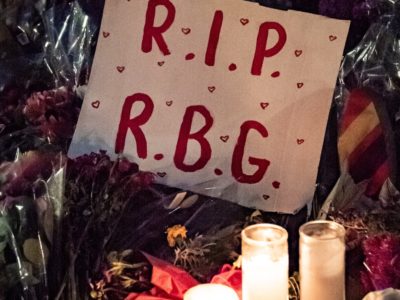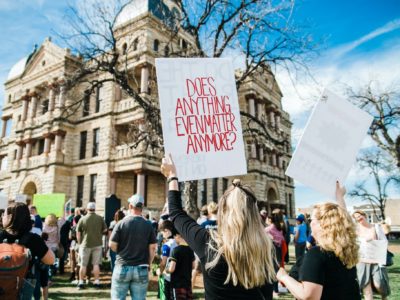No one will ever be able to rock a jabot like Ruth Bader Ginsburg. The justice’s iconic collars were just one of the many things America— and the internet— loved about the Notorious RBG. Her death in September left a hole in the hearts of millions. Her judiciary work impacted the masses: from women’s rights to mental health advocacy, RBG’s legacy is secure in the hands of rising law students looking to make an impact on our country.
Want to find out more? Check out 10 things RBG achieved to help you!
10. Yes, Women Can Succeed in a Male Dominated Career

Ruth Bader Ginsburg faced the trials that women today still actively attempt to hurdle: sexism and a male-dominated world. While attending Harvard Law (yes, Elle Woods was not the only fashionable lady to take on Harvard Law), she was one of nine women in a class of 500 men. Talk about being outnumbered. But she didn’t stop there—she transferred out of Harvard after two years to finish law school at Columbia University. Everyone should have known from the beginning that RBG meant some serious business, because she tied for the top position in her class. For all of my ladies out there taking on a male dominated field, here is your sign: if RBG could show these men what a woman can do, so can you.
She had trouble finding a job due to her sex and religious background post-graduation. So, she ended up passing on trying to work for a law firm, and instead went into a courtship with the Southern District of New York. Then, of course, she went on to be appointed to the United States Court of Appeals for the District of Columbia Circuit, before being nominated to the Supreme Court in 1993 by President Bill Clinton. Not to mention that she was the second woman to ever serve on the court while also battling cancer, her husband passing and being a mother. Isn’t it wild how a 5’1 Jewish woman could upset the balance of a patriarchally-favored career and position?
9. Ladies! You Can Open A Bank Account by Yourself

That’s right. Prior to 1974, women were required to have a male co-signer on major documents like a bank account, mortgage or credit card. Due to RBG’s work to push the Equal Credit Opportunity Act into existence, a women’s right to have these important functions of life, without a man alongside her, remains safe for over 45 years. Might I add that 45 years isn’t some monumentally ancient number? Chances are that you know someone that age or older. Imagine not being able to pay for a house by yourself just because you’re a woman?
“Her advocacy for women’s rights has always been inspiring, and those things, of course, impact me personally. I also think her role in the system is something that women in law can look to and realize that they are, in fact, in a position to be able to make large strides towards change. RBG opened many doors for individuals like me, and now it is our job to make sure we continue to open doors for everyone,” New York Law School student Brianna-Marie Joerger said.
It was RBG’s co-authored piece about a sexist Idaho state law that made the court use the 14th amendment strike down a discriminatory law towards women for the first time. Thanks again, RBG.
8. State Funded Schools are No Longer a Boys-Only Club

Surprising, right? RBG ruled in 1996 that state funded education could not deny a woman entrance based on her sex. The Virginia Military Institute was the last all-male public undergrad college in America until RBG got her say in United States v. Virginia. The school tried to say that they would create a women’s-only institute comparable to VMI’s programs, but that really didn’t add up to much. VMI would still be in violation of the Equal Protection Clause. So, our wonderful RBG, alongside of six other judges, ruled for United States—and she wrote the majority opinion on behalf of the court, too.
“She had a real way with words, she was simple yet complex. She just always felt like she looked at two halves of a whole and put them together rather than looking at one side over the other,” Hofstra Law student Taylormarie Capoziello said.
Boys, you had your fun—it’s the ladies’ turn now.
7. A Couple of American Firsts

RBG is a known groundbreaker. She’s the first Jewish woman to serve on the United States Supreme Court. She founded the Women’s Rights Law Reporter in 1970, which became America’s very first law publication focused on women and gender within the field. The Reporter is still active in Rutgers’s Law School, for all of my prospective New Jersey law students.
Why Rutgers, one may ask? Well, from 1963 to 1972, RBG worked as a law professor at the Newark campus. Two years after leaving Rutgers, she wrote the first textbook regarding sex discrimination law. After battling sexism throughout her career, it feels appropriate that she took that first step towards fighting it through law classrooms throughout the United States. After all, during that time period, discrimination was a taboo topic. The Civil Rights Act of 1964 was only a decade old when she published the textbook, and unfortunately, racism and sexism ran unabashed back then. At least today we can call out people for their poor behavior.
6. Negatively Impacted by Environmentally Unfriendly Companies? RBG has Your Back.

Back in 1999, Friends of the Earth, Inc. v. Environmental Services (TOC), Inc. came to the United States Supreme Court. Laidlaw Environmental Services, Inc. disposed of waste in a river in South Carolina that once impacted their community. The Clean Water Act? Violated. No one wants mercury in their water. While the company then went into compliance with their permit with the National Pollutant Discharge Elimination System after they were caught, RBG still held that they need to pay penalties to civilians impacted. Her majority piece spoke for her and her six colleagues, and the Notorious RBG once again struck back in January 2000.
5. She Stood Up for Mental Health

Mental health’s status as a taboo topic feels long and treacherous, but RBG never gave it a second thought. She, along with five other judges, ruled that people with mental disabilities possess the right to community-based housing back in 1999. However, she wasn’t always on the majority side. In 1994, she wrote a dissent regarding the Consolidated Rail Corporation v. Gottshall case. Gottshall saw his friend collapse whilst at work, but their employer insisted that he keep working in extreme heat. His friend got up, but ultimately collapsed again, then ended up passing away on the job from a heart attack. Gottshall had to watch his friend die, while being forced to go back to work as if it was business as usual, according to the case. Gottshall ended up developing PTSD, depression and admitted into a psychiatric facility as a result of this traumatic event.
The question regarding the case revolved around whether or not it was legal for an employee to hold his employer responsible for emotional destress caused by the employer’s negligence on the job. The court ruled no. RBG, on the other hand, spoke out against this ruling in her admirable turn of phrase.
“It truly is amazing, Justice Ginsburg’s ability to disagree respectfully. To make such a compelling argument in favor of treating others as humans, instead of treating each case as if there is a set answer and a strict application of the rules, even if it means that justice will not be served. In essence, Justice Ginsburg is a great justice because she is not afraid to stand up for the people, not afraid to change the law in order to actually provide justice and not afraid to stand up for what she believes in,” Seton Hall Law student Anthony D’Ambrosio said.
A judiciary icon, indeed.
4. She Sided with the Girls, the Gays and the Theys

I can remember the day the Supreme Court ruled that same-sex couples could finally get married in all 50 states. I doubt I will ever see the same jubilation on the faces of thousands of people in the same way ever again—it was truly something to behold. But here is the startling reminder: same-sex couples were given the right to marry only five years ago. RBG fell on the five to four majority side, naturally. She is the only Supreme Court Justice to officiate a same-sex couple’s marriage, and backed the fight for gay rights throughout her career. Talk about a serious ally to the LGBTQ+ community.
3. RBG v. Vagueness

RBG is no stranger to some iffy definitions. She led the majority in Sessions v. Dimaya, a case that wanted to make it legal to “expel” specific immigrant non-citizens for crimes of violence. Dimaya had two counts of residential theft and found himself deported because of it, despite being a legal U.S. citizen. But what constitutes a “crime of violence” in an “ordinary case,” according to the Immigration and Nationality Act? The definition, according to RBG, seemed vague, and therefore a violation of our Due Process Clause.
This was not the first time that RBG dealt with some indistinct designations, either. Back in 2015, she sided with the majority once again, saying that the Armed Career Criminal Act’s wording of “violent felony” was also vague. “Vague” in law means that things can go awry, so it’s thanks to RBG that we are once again back on the technicality of sentencing, where no one can mess with it.
2. The Second Amendment? Outdated.

RBG’s position on the Second Amendment is not one that the NRA would particularly appreciate. In a dissent written by RBG for the case District of Columbia v. Heller, her succinct response regarding the amendment turned some heads…but others nodded in agreement. Her belief is that the amendment is archaic. I mean, come on: they fashioned this amendment when guns could only shoot one bullet at a time, just a few short years after America won the Revolutionary War.
America also had no standing army at the time, simply groups of state militia men that needed weaponry when they were called to arms. So, to RBG, this amendment served its purpose back in the day, but is completely old-fashioned in modern America since we no longer need a militia with our army. Naturally, she would be for gun control. America is the number one country; for school shootings, that is.
1. She Fought for a Woman’s Right to Choose

America’s indecisiveness on the subject of abortion definitely turned some nice Thanksgiving dinners to ugly ones when conflicting opinions clash. As for RBG? She has no problem stirring the pot, especially in her dissents. She stuck up for Roe v. Wade, which once more became a contested topic since Donald Trump got Amy Coney Barrett to replace RBG’s seat. But RBG’s legacy of sticking up for a woman’s choice to choose is no doubt a forceful presence on the court.
Her dissents on this topic are especially interesting, and highlight her thoughts and opinions on the state of women’s rights within the country. For example, the Gonzales v. Carhart case upheld the illegality of a late-term abortion, and how that ruling is not an undue encumbrance on women’s abortion rights. RBG did not have any of that—she even called it “an effort to chip away at a right declared again and again.” She also tore into Burwell v. Hobby Lobby in her dissent, after the court ruled that the store could not be required to give insurance for things that they believe are on the same level of abortion, i.e. birth control. She suggests that the courts were supporting specific faiths over others. Separation of church and state, anyone?



















